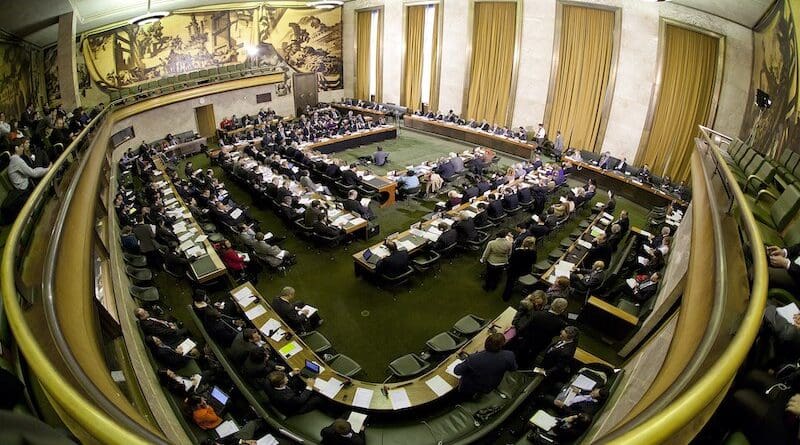Challenges And Perspectives: Assessing 2024 Conference On Disarmament First Plenary – OpEd
By Sher Bano
The Conference on Disarmament (CD), established in 1979, emerged as the primary multilateral forum for global disarmament negotiations following the agreement among Member States during a special session of the UN General Assembly in 1978.
Operating with a unique relationship to the United Nations, the CD adopts its own rules and agenda while aligning with UNGA recommendations. Despite its autonomy, the CD’s secretary is appointed by the UN Secretary-General, and it reports regularly to the General Assembly. Decisions are consensus-based, emphasizing cooperative diplomacy. Over its history, the CD has been instrumental in negotiating key multilateral agreements, including the NPT, environmental and seabed treaties, and conventions on biological and chemical weapons, as well as the CTBT. Today, the CD remains pivotal in addressing contemporary global security challenges, championing disarmament, and thwarting the spread of weapons of mass destruction.
The recent Plenary session of the Conference on Disarmament (CD) for its 2024 session, held under the Presidency of India on 23rd January, 2024, has once again spotlighted the complexities and hurdles inherent in multilateral negotiations concerning disarmament issues. Ambassador Bilal Ahmad, Pakistan’s Permanent Representative to the CD, delivered a statement during the concluding plenary, scrutinizing both procedural and substantive aspects of the process conducted under India’s presidency.
Pakistan’s aimed to provide clarity on its stance regarding the proposed draft decision and to shed light on the procedural and substantive concerns guiding its position. A notable reservation expressed by the Pakistani delegation pertained to the process of consultations, citing the absence of consensus on proposed changes to the 2022 decision, which Pakistan regarded as a delicate compromise.
A significant point of contention raised by Pakistan was the exclusionary nature of small group consultations and the introduction of contentious proposals deviating from previously agreed-upon baselines. Pakistan emphasized the importance of maintaining previously agreed formulations as a foundation for consensus-building, highlighting the need for transparency and inclusivity in the negotiation process.
On substantive matters, Pakistan reiterated its support for the 2022 decision as the framework for conducting the CD’s work. It argued that disagreements within the Conference primarily arose from divergent policy priorities, threat perceptions, and national security concerns rather than deficiencies in the 2022 mandate. Pakistan also expressed reservations about the disproportionate focus on certain issues, such as the Fissile Material Cut-off Treaty (FMCT) and the Shannon Mandate, which they believed hindered progress and perpetuated deadlock in the Conference.
Pakistan’s intervention underscores the broader challenge of reconciling the national priorities of member states with the collective objectives of the CD. While acknowledging the importance of accommodating everyone’s concerns, Pakistan emphasized the need for flexibility and compromise from all delegations to break the impasse and make meaningful progress on disarmament issues.
In addition to Pakistan’s current stance, it’s crucial to consider its proposal from the previous year. In the 2023 session, Pakistan put forth a comprehensive plan aimed at fostering confidence-building measures (CBMs) among CD members. This proposal outlined a roadmap for enhancing transparency, trust, and cooperation among member states, thereby laying the groundwork for substantive disarmament negotiations. It included provisions for regular information exchanges, joint military exercises, and verification mechanisms to build mutual confidence and reduce tensions.
As Indonesia assumes the presidency of the Conference, there is renewed hope for constructive engagement and dialogue under their leadership. Pakistan expressed willingness to participate in joint efforts aimed at reaching consensus and reiterated its commitment to contributing to the disarmament agenda in a manner that respects the interests and concerns of all member states.
In conclusion, the 2024 Plenary of the Conference on Disarmament underscores the persistent challenges facing multilateral disarmament negotiations and emphasizes the importance of fostering an environment characterized by trust, transparency, and inclusivity to overcome differences and advance collective security objectives. Pakistan’s stance underscores the need for principled diplomacy, compromise, and concerted efforts to break the deadlock and pave the way for meaningful progress in disarmament efforts. Additionally, by considering Pakistan’s proposal from the previous year, there’s an opportunity to incorporate confidence-building measures into the ongoing disarmament discourse, potentially enhancing prospects for substantive progress in future negotiations.

